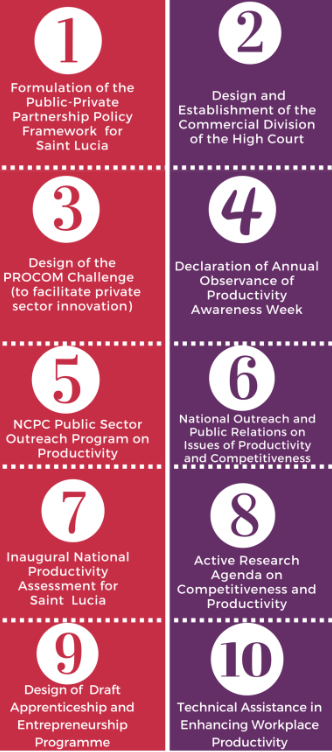 Since its establishment, the National Competitiveness and Productivity Council (NCPC) has been committed to enhancing both productivity and competitiveness of Saint Lucia and as such closely follows benchmarks set by regional and international agencies. One such benchmarks would be the ten (10) principles of competitiveness adopted by the Americas Competitiveness Network (RIAC) and the World Economic Forum 12 pillars of competitiveness.
Since its establishment, the National Competitiveness and Productivity Council (NCPC) has been committed to enhancing both productivity and competitiveness of Saint Lucia and as such closely follows benchmarks set by regional and international agencies. One such benchmarks would be the ten (10) principles of competitiveness adopted by the Americas Competitiveness Network (RIAC) and the World Economic Forum 12 pillars of competitiveness.
The Establishment of the National Competitiveness and Productivity Council with an Accompanying Technical Secretariat
The Government of Saint Lucia established the National Competitiveness and Productivity Council (NCPC) with its accompanying Technical Secretariat on 5 August 2013. The establishment of the Council was made possible with funding assistance provided by the Compete Caribbean Programme in the form of a Technical Assistance Grant for the Project entitled: “Strengthening Public-Private Dialogue in Saint Lucia”. Membership of the Council include officials from the private and public sectors, civil society and trade unions.
The objectives of the Council are:
- To raise awareness and understanding of the importance of competitiveness and productivity to economic well-being.
- To monitor all aspects of productivity growth and competitiveness in Saint Lucia vis-à-vis other countries.
- To monitor all aspects of productivity in the various sectors of the economy.
- To provide advice to the Government on actions to promote productivity growth and competitiveness in Saint Lucia.
- To monitor and reporting on the progress made in the implementation of solutions to actions designed to boost competitiveness and productivity in Saint Lucia.
- To assess specific competitiveness and productivity topics in greater detail.
- To advocate on actions to promote productivity and competitiveness.
The Council has begun its work and has focused heavily on building the awareness around the issues of Productivity and Competitiveness. Some of the work of the Council include:
- Inaugural National Productivity Assessment for Saint Lucia
To effectively carry out its mandate, the Council first sought to assess current levels of productivity in Saint Lucia as well as engage key stakeholders to understand current challenges and possible solutions in raising productivity in various sectors. As a consequence, the Council undertook a the following studies and activities::
- Estimating overall productivity levels for Saint Lucia for the period 2000 to 2013
- Estimate unit cost of labor from 2000 to 2013
- Estimate productivity levels for six sectors of the economy including: manufacturing, agriculture, construction, wholesale and retail, financial, tourism.
- Assessment of four (4) pilot agencies of Government (Inland Revenue Department, Customs Department, Physical Planning Section/Development Control Authority and Transport Department).
- Benchmarking Saint Lucia’s productivity levels with countries where data was available.
National consultations were held with key sectors of the economy including the Health, education and the youth. In addition, discussions were also held at the community levels. The objective of those consultations was to discuss the issues affecting productivity in Saint Lucia and to solicit ideas from the participants on ways that productivity can be improved nationally.
The Council continues to measure the level of productivity in the economy.
2. Instituted the Annual Observance of “Productivity Awareness Week”
In its first year (2014), the NCPC focused its attention on bringing greater awareness to the issues of productivity and competitiveness in Saint Lucia and instituted the annual observance of “Productivity Awareness Week” highlighting the very apt theme “Enhancing Productivity is OUR Responsibility”. The outcome for the week resulted in cultivating and promoting productivity awareness among individuals, enterprises and the nation – stirring, motivating and encouraging them to act in the interest of higher productivity. Some of the activities include private and public sectors forums, debating and essay competitions involving the secondary schools as well as Sir Arthur Lewis Community College.
The observance also continued in 2015 and focused on providing training and tools to entrepreneurs in an effort to assist them in becoming more competitive in the current economic environment. The Week in 2015 included seminars for young entrepreneurs and bus drivers, secondary school productivity tour and a primary school fair, showcasing initiatives from the public sector that impact productivity.
The Council is in the process of planning its third observance of Productivity Awareness Week for 2016.
3. Design of the National Competitiveness and Productivity Fund – PROCOM Challenge
The Council has advocated for the setting up of a National Competitiveness and Productivity Fund. This fund is expected to assist the private and public sector to finance innovative projects that is geared towards the enhancement of productivity and competitiveness. The Fund was launched and branded as the PROCOM Challenge on 18 April 2016.
4. NCPC Public Sector Outreach Program on Productivity
In continuing the drive to heighten the awareness of the importance of productivity and competitiveness to economic well-being, the NCPC engaged over seventeen (17) public sector agencies for an opportunity to inform of the roles and functions of the NCPC as well as to dialogue on the way forward regarding joint collaborations between the NCPC and public sector agencies in productivity and competitiveness related initiatives.
The sessions were quite interactive and offered the opportunity to dialogue on issues affecting the various Government Ministry’s productivity levels. This initiative occurred during the period June- September 2015. A questionnaire was administered at each ministry which was consulted. The results of the questionnaires were collated and will inform the work of the Council in the future with respect to enhancing public sector productivity.
5. Design and Establishment of the Commercial Division of the Court – A Business and Competitiveness Reform
As part of the technical assistance project with Compete Caribbean for the NCPC, The Commercial Division of the High Court, was identified as a high priority reform project to enhance the business environment and the Saint Lucia’s general competitiveness. The NCPC was given the mandate to coordinate this project and was done in collaboration with the Eastern Caribbean Supreme Court and the Ministry of Legal Affairs. The Division is expected to deliver an expeditious and cost effective mode of resolving disputes that directly affect the commercial and financial sectors in Saint Lucia. The Project was officially in January 2016.
The Council will continue to monitor the performance of the Commercial Division with respect to its efficiency to settling commercial disputes.
6. Active Research Agenda on Competitiveness and Productivity
- Comprehensive Entrepreneurship Program & Apprenticeship Program for Saint Lucia.
The principles of competitiveness speak to having high impact entrepreneurship to foster growth as well as pertinent education as a key element to drive competitiveness.
For the period 2015, the Research Team focused on two topics namely:
- Design of a comprehensive entrepreneurship program for Saint Lucia – looking at what exists and lessons learnt. The research is now completed and was presented to the Council members. The Research piece will be presented to the Ministry of Commerce for consideration.
- Design of a comprehensive apprenticeship program for Saint Lucia and its implications to policy – This research piece is also completed and has been presented to the Council.
It is expected that the research findings will lead to policy changes that can impact on productivity and the growth of the economy. For the period 2016/2017, the Council is exploring research in the area of labor market efficiencies.
7. Providing Training and Technical Assistance in Productivity Matters
The NCPC has been called upon to provide training and seminars on improving productivity in the work place as well as providing general motivation to staff members. This training is usually conducted by the staff from the Secretariat and some Council members. It is hoped that this arm of the NCPC can be enhanced to meet the increasing demands from both the public and private sectors.
The Council is designing assessment tools that can be used for both the private and public sectors.
8. National Outreach and Public Relations on Issues of Productivity and Competitiveness
A very important mandate of the NCPC is to promote the awareness and understanding of competitiveness and productivity to economic well-being. Therefore as part of its continued promotion of the awareness of productivity issues the Council has maintain a presence in the general public through a number of public relation initiatives. These include:
- Production of a Television Documentary series entitled “Productivity Matters” which currently airs on DBS, HTS, Calabash TV and NTN;
- An active presence on Facebook, Twitter and also on Pintrest and YouTube;
- Television interviews conducted with Choice, Calabash, TCT, GIS, DBS, HTS and other national stations for inclusion within their nightly news programs. Radio appearances were also made on Radio Saint Lucia (Inside Government and 90 Minutes), Kairi FM, WVent, RCI and Helen 100 FM;
- Print and video editions of the NCPC Productivity Tips (10 in all) were circulated within the Government (GOSL Notices), via our social media pages, on radio and on television;
- Two NCPC television commercials were commissioned and produced especially during the Productivity Awareness Week. As part of the public relations for Week, two jingles were produced in English and Kweyol;
- Weekly news articles were published in The Voice newspaper within our column ‘NCPC Perspective’. Press releases were circulated weekly to the various media houses.
9. Formulation of the Public-Private Partnership for Saint Lucia
The NCPC coordinated the formulation of the Public-Private Partnership policy for Saint Lucia. Technical assistance for this project was provided by the World Bank. The policy was approved by Cabinet. The Technical Secretariat was instrumental in formulating a PPP Core Team and Steering Committee who will be responsible for making the necessary institutional arrangements to oversee the effective implementation of PPPs in Saint Lucia.
10. Reporting to the Network of the Competitiveness of the Americas (RIAC)/Signs of Competitiveness of the Americas – Part of the Global Network
The Council actively monitors projects/initiatives within the public and private sectors that boost both competitiveness and productivity. The Council provides information on initiatives to the Network of the Competitiveness of the Americas (RIAC) to be included in the annual “Signs of Competitiveness Report for the Americas”. The Technical Secretariat has contributed to this report from the period 2013 – 2015.
11. Other Work in Progress includes:
The Council is currently in the process of formulating a 5-year strategy and action plan for enhancing overall productivity and competitiveness. It will be working with public sector agencies as well as the private sector in developing tools that will assist in measuring productivity at the unit level and recommendation solutions at the micro level in addressing issues related to productivity and competitiveness. This will allow the Council to work directly with agencies in resolving those issues.
Click here to download the document, NCPC Strides Towards Enhancing Productivity and Competitiveness.
Don’t forget that we are also #social. If you aren’t already following us, please check us out on:
Facebook: www.facebook.com/stluciancpc
Twitter: @stluciancpc
WordPress:ncpcstlucia.wordpress.com
Pinterest: https://www.pinterest.com/stluciancpc/
Google+: http://bit.ly/1O1NIy1
Youtube: http://bit.ly/1QGfLCP
Visit our website www.stluciancpc.org for regular updates on the work of the NCPC and other #productivity and #competitiveness related #matters.

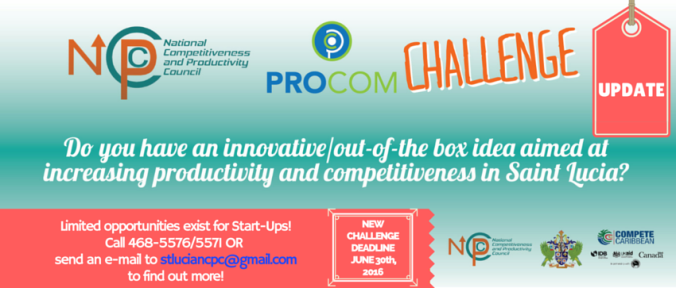
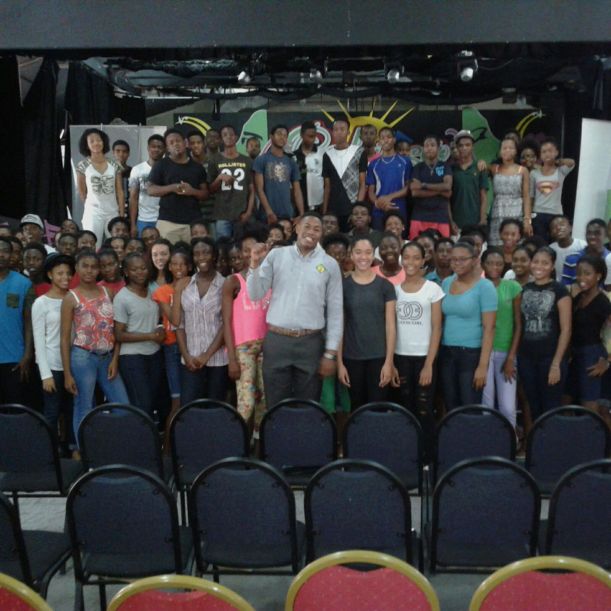

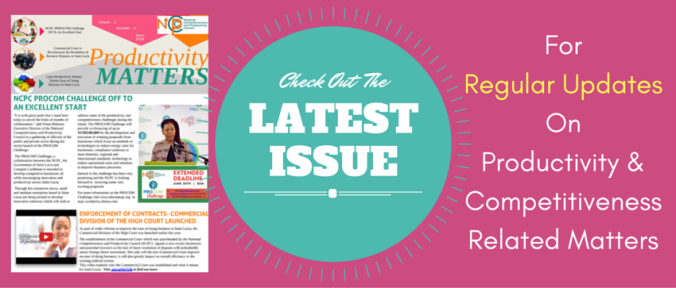

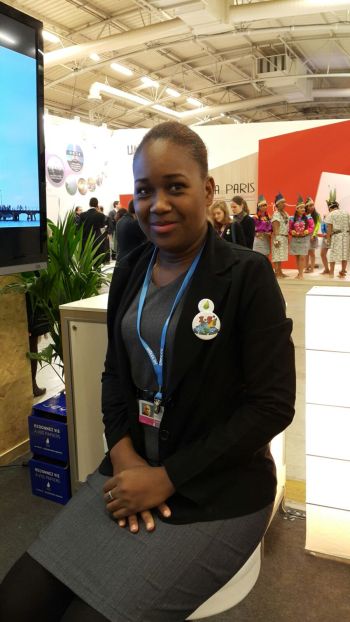
 Since its establishment, the National Competitiveness and Productivity Council (NCPC) has been committed to enhancing both productivity and competitiveness of Saint Lucia and as such closely follows benchmarks set by regional and international agencies. One such benchmarks would be the ten (10) principles of competitiveness adopted by the Americas Competitiveness Network (RIAC) and the World Economic Forum 12 pillars of competitiveness.
Since its establishment, the National Competitiveness and Productivity Council (NCPC) has been committed to enhancing both productivity and competitiveness of Saint Lucia and as such closely follows benchmarks set by regional and international agencies. One such benchmarks would be the ten (10) principles of competitiveness adopted by the Americas Competitiveness Network (RIAC) and the World Economic Forum 12 pillars of competitiveness.